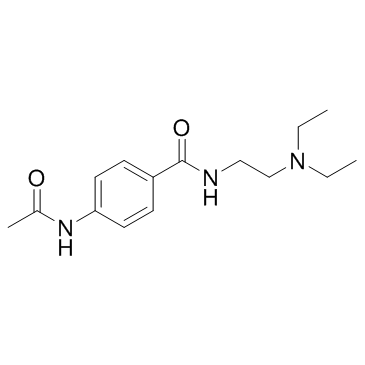乙酰普卡胺

乙酰普卡胺结构式

|
常用名 | 乙酰普卡胺 | 英文名 | N-Acetylprocainamide |
|---|---|---|---|---|
| CAS号 | 32795-44-1 | 分子量 | 277.36200 | |
| 密度 | 1.097g/cm3 | 沸点 | 500ºC at 760mmHg | |
| 分子式 | C15H23N3O2 | 熔点 | 138-140ºC(lit.) | |
| MSDS | 中文版 美版 | 闪点 | 256.2ºC | |
| 符号 |

GHS07 |
信号词 | Warning |
|
Drug-herb interaction: effect of St John's wort on bioavailability and metabolism of procainamide in mice.
Arch. Pathol. Lab. Med. 131(7) , 1094-8, (2007) St John's wort induces the activity of the cytochrome P450 enzyme system causing treatment failure because of increased metabolism of many drugs. Procainamide is metabolized by a different pathway to N-acetyl procainamide.To study St John's wort-procainamide ... |
|
|
Application of computer-assisted radiotelemetry in the pharmacokinetic and pharmacodynamic modeling of procainamide and N-acetylprocainamide.
J. Pharm. Sci. 85(6) , 595-9, (1996) The cardiovascular pharmacodynamics (PD) of procainamide and N-acetylprocainamide have not been well characterized in small rodents without the presence of anesthesia or restraint. This study was undertaken to examine the pharmacokinetics (PK) and PD relation... |
|
|
The discordant influences of infarct healing on the electrophysiologic effects of procainamide and N-acetylprocainamide.
J. Pharmacol. Exp. Ther. 273(1) , 315-9, (1995) Ischemic zone refractoriness and conduction delay respond differently to infarct healing and, hypothetically, may exert discordant influences on the electrophysiologic action of different classes of antiarrhythmic drugs. This study evaluated the influence of ... |
|
|
Pharmacokinetic and pharmacodynamic comparisons of twice daily and four times daily formulations of procainamide in patients with frequent ventricular premature depolarization.
J. Clin. Pharmacol. 36(7) , 623-33, (1996) A study was conducted to evaluate the pharmacokinetics of procainamide and its active metabolite, N-acetylprocainamide (NAPA), as a function of dose and formulation and to characterize the relationship between ventricular premature depolarization (VPD) rate a... |
|
|
Improved high-performance liquid chromatographic assay for the determination of procainamide and its N-acetylated metabolite in plasma: application to a single-dose pharmacokinetic study.
J. Chromatogr. Sci. 36(1) , 49-54, (1998) An improved high-performance liquid chromatographic assay for the determination of procainamide and N-acetylprocainamide (NAPA) at concentrations observed up to 32 h after a single oral dose administration of procainamide to human subjects is reported. Follow... |
|
|
Inhibition of N-acetylation of procainamide and renal clearance of N-acetylprocainamide by para-aminobenzoic acid in humans.
J. Clin. Pharmacol. 35(9) , 902-10, (1995) Procainamide administration often results in excessively high serum N-acetylprocainamide (NAPA) concentrations and subtherapeutic serum procainamide concentrations. Inhibition of N-acetylation of procainamide may prevent accumulation of excessive NAPA while m... |
|
|
Multicenter evaluation of the Abbott AxSYM procainamide and N-acetylprocainamide assays: comparison with Abbott TDx/TDxFLx, Syva EMIT 2000, DuPont ACA, and HPLC methods.
Clin. Biochem. 31(1) , 55-8, (1998)
|
|
|
Effect of age, gender, and race on steady state procainamide pharmacokinetics after administration of procanbid sustained-release tablets.
Ther. Drug Monit. 20(1) , 73-7, (1998) Procainamide hydrochloride is a Class 1A antiarrhythmic agent administered intravenously or orally for treatment of symptomatic ventricular premature depolarizations (VPD), nonsustained ventricular tachycardia, and life-threatening ventricular arrhythmias. A ... |
|
|
The influence of moderate and chronic exercise training on the pharmacokinetics of procainamide and N-acetylprocainamide.
Biopharm. Drug Dispos. 19(5) , 291-6, (1998) The effect of moderate and prolonged exercise on the disposition and metabolism of drugs has not been extensively examined. The present study examined the effect of exercise training on the pharmacokinetics of procainamide and its active metabolite, N-acetylp... |
|
|
Application of capillary electrophoresis to the in vitro assessment of drug metabolism.
Biochem. Soc. Trans. 23(3) , 432S, (1995)
|